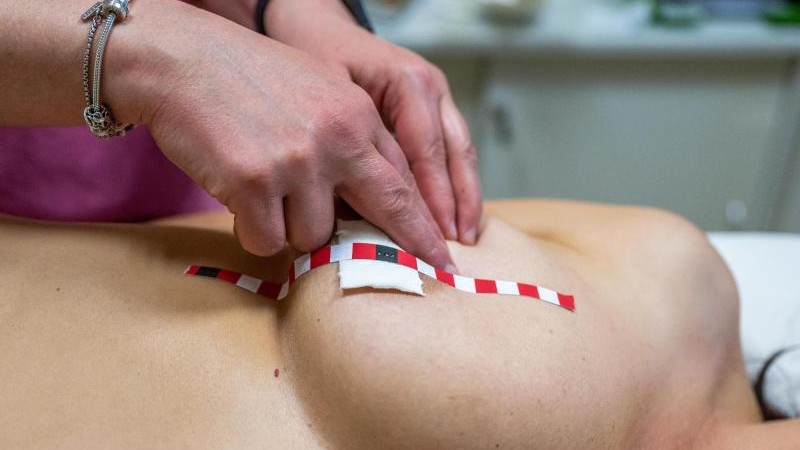Reichenbach (dpa) – Kristen Kanetzky proceeds with extreme caution. She spends about an hour with her patient, feeling every centimeter of her chest with her fingers. It also feels for the lymph nodes in the neck, collarbone, and armpit.
You get an overview of the temperature, shape, and strength of the tissue. “It’s like an inspection,” Kanetzky says. The blind woman has been in the medical tactile examination (MTU) field for nearly ten years. She offers a detailed palpation examination of the breast, the so-called palpation imaging, in gynecological practices.
She recently worked in the care center at the Paracelsus Clinic in Reichenbach, Saxony. She also works with practices in other cities in the region. “You can’t study our sense of touch. As blind people, we rely on it every day,” she says. The ability to read Braille, which involves feeling small dots with your fingers, is a good prerequisite for this job. It is organized by Discovering Hands Service GmbH, which was founded in Mülheim an der Ruhr (North Rhine-Westphalia) in 2011. The social enterprise has already trained nearly 60 tactile medical examiners for the blind or visually impaired (MTU), he says Frank Hoffman, founder and idea generator.
Many nodes in gynecological clinics are already one to two centimeters in size, explains the obstetrician-gynecologist. “I used to be dissatisfied, in daily practice we have very little time to feel the breasts.” According to their own studies, already trained blind women can detect changes from a size of 0.6 cm. Kristen Kanitzky says it has often been suspected that blind people and their sense of touch have any benefit in preventing cancer. “In the meantime, the doctors trust me. When I feel small changes, they take more steps.”
Tactile science is recommended once a year, says Kanetsky, who has been the only MTU in Saxony for a long time. “Many women come to me regularly. Previous breast cancer patients also use this type of additional examination. There are normal changes in breast tissue that can be frightening, but we can distinguish them very well by our sense of touch.” Frank Hoffman explains that MTU should be understood as a medical assistant. “The results are handed over to the clinicians. They evaluate it, make the final diagnosis and decide how to proceed.”
Susan Weig Remmers of the German Cancer Research Center in Heidelberg is evaluating the range of services offered by palpation as a complement to early cancer detection and comparable to tactile examination at a gynecologist. At the same time, expectations are tempered: “Unfortunately, there is no scientific evidence that it can reduce the mortality rate of breast cancer patients in the context of serial examinations.” This applies to tactile examinations by gynecologists as well as to touch.
“The cancer has to have reached a certain size before you can feel it.” For this reason, touch imaging is only recommended for women between the ages of 50 and 69 as an additional service. “Mammography cannot replace it,” explains Weg-Remers, chief of the Cancer Information Service. Only this has been shown to reduce deaths from breast cancer.
Hoffman explains his concept to women who are blind or have low vision who are organized through Discovering Hands, undergoing a ten-month rehabilitation under medical supervision. Training is supported by rehabilitation providers, institutions and on scholarship basis. In addition to Vogtland, there are also tactile medical examiners in Dresden, Leipzig and Chemnitz in Saxony. According to Hoffman, 31 statutory health insurers and all private health insurers now cover the costs of the examination.
When it comes to the sensitive issue of breast cancer prevention, Susan Weig-Remmers says: The German Cancer Research Center recommends early, periodic screening for breast cancer. “But no investigation is 100% reliable. It all runs the risk of false alarms.” Subsequent invasive examinations such as a biopsy carry additional risks. “They can lead to bleeding or infection. Not every tumor found has developed aggressively – one speaks of overdiagnosis. However, all patients then undergo cancer treatment, which is not always clear if it will be necessary.” Therefore, it remains a personal decision about which early detection examinations a woman will use.
© dpa-infocom, dpa: 220410-99-866337 / 2

“Alcohol buff. Troublemaker. Introvert. Student. Social media lover. Web ninja. Bacon fan. Reader.”







More Stories
Newly appointed Science, Research and Innovation Council
Asparagus with Salmon and Avocado: A slightly different asparagus dish
Intelligence and Alzheimer's disease: How fit is your brain? Your eyes guide her